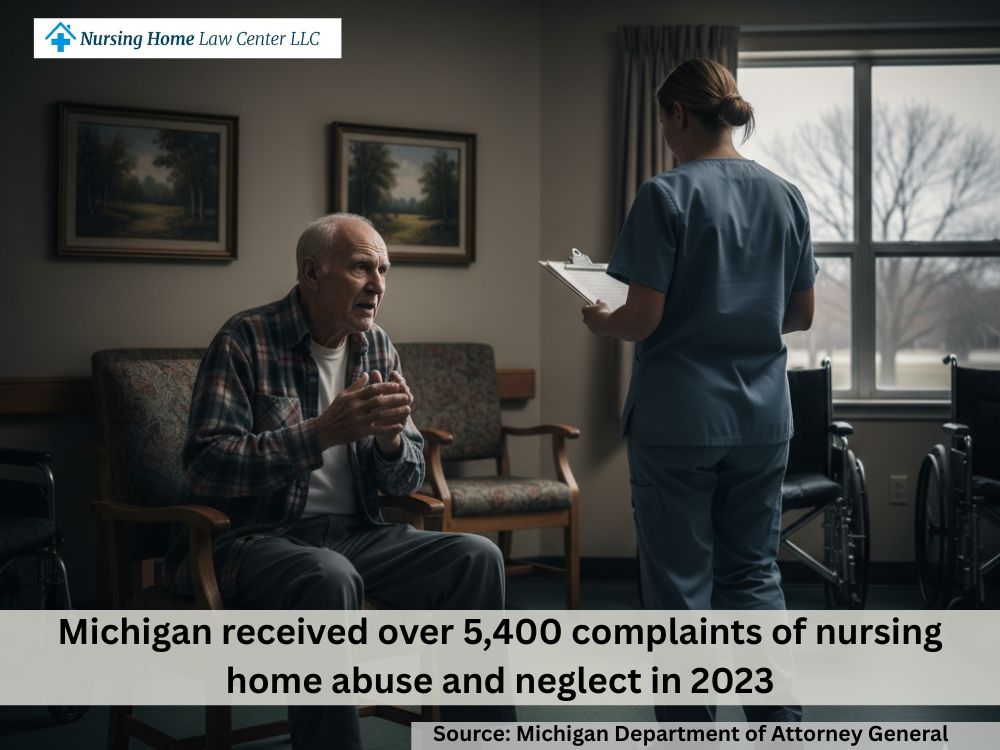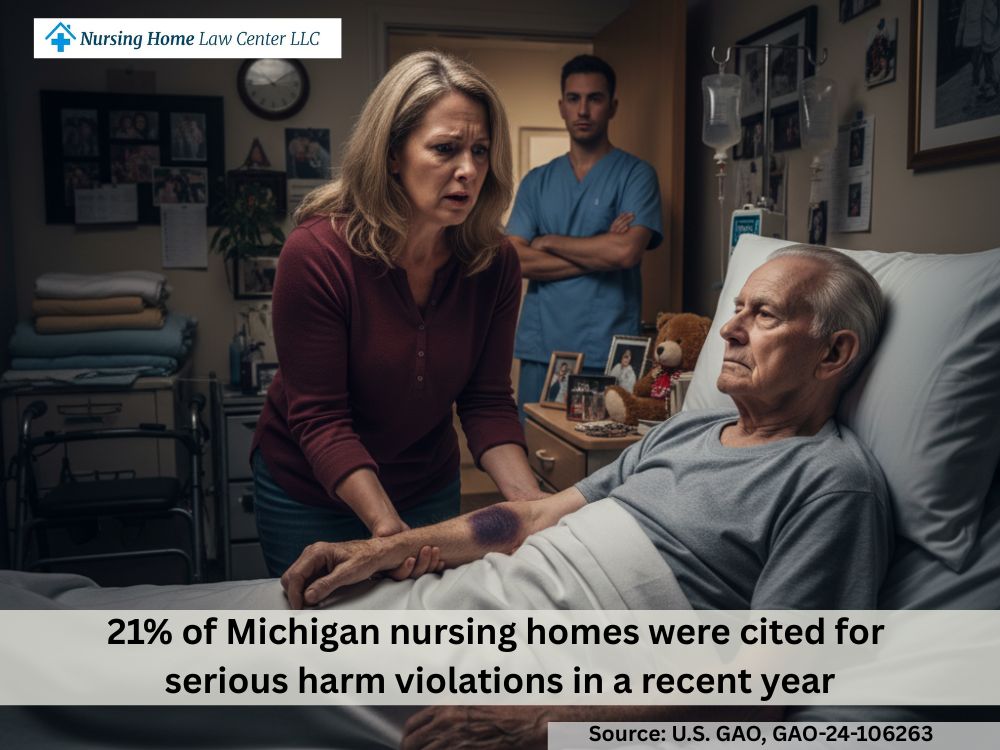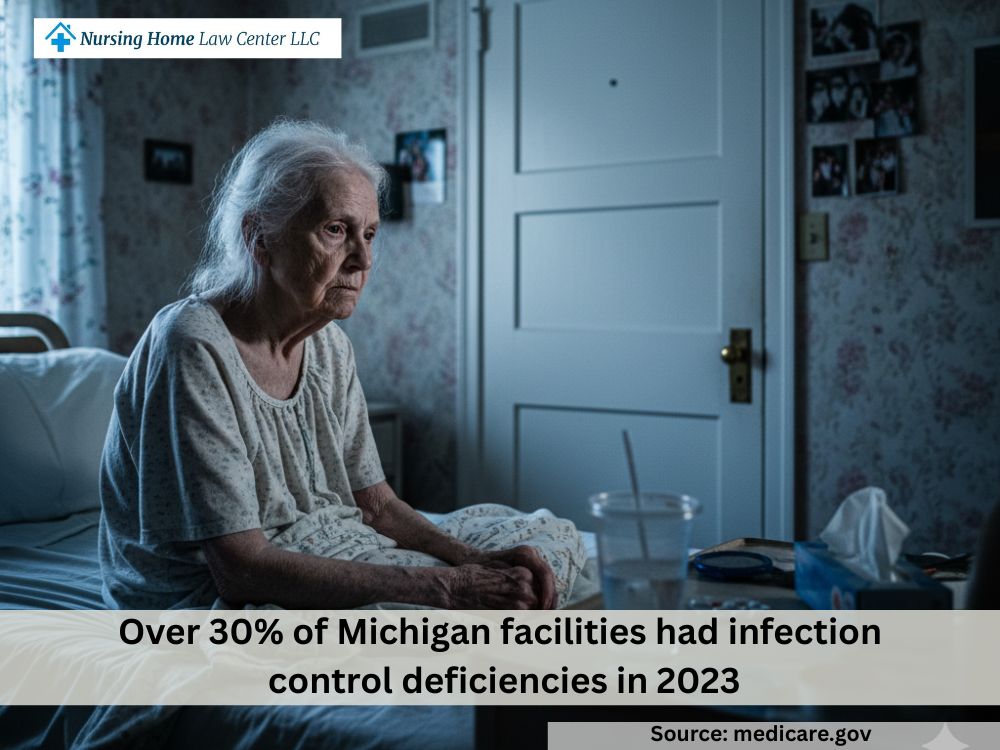The Nursing Home Law Center is committed to providing the legal resources necessary to hold negligent facilities accountable.
Michigan Nursing Home Abuse Lawsuit Settlements
If your loved one has suffered harm in a Michigan long-term care facility, you’re not alone, and you don’t have to face this on your own. At Nursing Home Law Center, we have obtained substantial Michigan nursing home abuse lawsuit settlements for victims and their families.
We believe every resident deserves dignity, safety, and quality care. If those basic expectations were violated, we’re here to listen, provide support through the legal process, and help you seek justice for your loved one.
Settlement and Verdicts Recovered by Our Nursing Home Abuse Lawyers
With years of focused experience, our Michigan nursing home abuse lawyers have represented individuals and families in a wide range of nursing home abuse cases across the state, holding facilities accountable for their lapses in care.
$2,150,000 Settlement
Walter entered a Detroit-area nursing home for short-term care but developed advanced bed sores that were left untreated. The wounds became infected, leading to sepsis and his untimely death. Records showed the facility was cited for failing to provide adequate care, including failure to reposition residents. The settlement reflected both the severity of the neglect and the endured emotional trauma.

What Types of Financial Compensation Can Be Recovered Through Nursing Home Abuse Settlements?
Michigan nursing home abuse lawsuits often include compensation for the financial losses, physical harm, and the emotional impact caused by neglect or abuse.
Economic Damages
Economic damages cover the measurable costs that result from mistreatment in a Michigan nursing home.
Medical Bills
Victims frequently require emergency treatment, surgery, extended hospital stays, or long-term medical oversight. The costs of these services–along with prescription medications and follow-up visits–can be fully recoverable.
Relocation Costs
When a resident must be moved due to dangerous or negligent conditions, families often face added costs. Expenses for transferring the resident, setting up care in a new facility, and breaking prior care contracts may be included in a settlement.
Rehabilitation and Recovery Services
Neglect often leads to serious injuries, such as broken bones, pressure ulcers, or neurological damage. Costs related to physical, occupational, or speech therapy may be compensated under a settlement.
Private In-Home Care
Some Michigan families opt to bring their loved one home following an incident of abuse or severe neglect. In those cases, the costs of hiring caregivers, nurses, or other support staff may be recovered.
Medical Equipment and Supplies
If the resident’s injuries require the use of medical equipment–such as mobility aids, specialized bedding, or wound care supplies–those expenses can be included in the claim.
Funeral and Burial Expenses
In wrongful death cases, the family may be entitled to recover costs tied to end-of-life arrangements, including funeral services, burial or cremation, and memorials.
Loss of Financial Support
While many nursing home residents are retired, there are situations where the resident provided financial support or benefits to others in the household. That loss can be factored into the settlement amount.
Non-Economic Damages
Non-economic damages are meant to compensate for the lasting emotional and psychological impact of the abuse or neglect.
Emotional Distress
Both residents and family members can experience deep psychological trauma following abuse. Compensation may be available for anxiety, fear, grief, and lasting psychological harm.
Pain and Suffering
Covers the physical suffering and emotional hardship the resident went through as a result of the abuse or neglect. In many cases, this becomes one of the largest components of a nursing home abuse settlement.
Permanent Injury or Disfigurement
Some residents are left with permanent disabilities or visible injuries that impact their daily life and well-being. Settlement amounts often reflect the severity and duration of these impairments.
Loss of Dignity or Enjoyment of Life
If neglect robs a resident of their independence or ability to engage in daily routines–such as walking, eating, or socializing–it can justify compensation for that diminished quality of life.
Loss of Companionship
In fatal cases, family members can seek compensation for the emotional void left behind–the absence of care, love, and connection that the resident once provided. These damages reflect the deep personal loss survivors experience.

What Is the Average Settlement for Nursing Home Abuse and Neglect in Michigan?
According to Law.com’s VerdictSearch, the average settlement in nursing home abuse cases in Michigan is approximately $1,926,944, with a typical range stretching from $282,698 to over $5 million.
Several factors can influence how much compensation is awarded in a nursing home abuse or neglect case:
- Severity of harm: Cases involving wrongful death, untreated pressure ulcers, or permanent disability typically result in higher payouts.
- Type of claim: Cases resolved by verdict may yield higher awards than settlements, though verdicts also carry more risk.
- Facility history: If the Michigan nursing home involved has prior violations or has been investigated for substandard care allegations, it can increase settlement value.
- Evidence strength: Strong medical records, apparent signs of nursing home neglect, and credible witness testimony can all support a larger award.
- Regulatory investigations: Involvement by the United States Attorney’s Office, Michigan Attorney General, or Health and Human Services may indicate systemic neglect that leads to higher settlements.
- Pain and suffering: Physical pain, emotional distress, and loss of dignity all contribute significantly to the value of a claim.
- Long-term care costs: If a resident requires ongoing therapy, in-home care, or medical equipment, those projected expenses can increase compensation.
Example Nursing Home Lawsuit Settlements and Verdicts
$5,000,080 Jury Verdict – Dementia Patient Dies After Ingesting Detergent at Southfield Facility
Willie Mae Henderson, a 90-year-old dementia patient, died after ingesting dishwasher detergent at The Fountains at Franklin, a Watermark Retirement Communities facility in Southfield, Michigan. She accessed an unsecured kitchen cabinet while unsupervised in a memory care unit.
At the time, only one caregiver was overseeing 18 residents. Her estate sued for negligence, arguing her death was entirely preventable. The jury agreed, awarding $5,000,080 in damages. The defense claimed the cabinet was secured and that Henderson was responsible for opening it.
$1,650,000 Default Judgment – Resident Dies After Being Left on Bus for 14 Hours
Susanna West, 87, who suffered from mild dementia, was left unattended on a nursing home bus for 14 hours following a shopping trip organized by Hearthstone Management, Inc. She was found in the early morning hours, dehydrated and hypothermic, and later died after ten weeks in a catatonic state.
The plaintiff alleged that the staff failed to perform a head count or report her missing promptly. The defendant claimed West locked herself on the bus. A default judgment of $1,650,000 was entered after the defendant failed to maintain legal representation or respond to the claims.
$775,000 Settlement – Fatal Falls at Grand Rapids Home for Veterans
Joseph Falarski, 88, suffered two severe falls within days at the Grand Rapids Home for Veterans. Diagnosed with Alzheimer’s and assessed as a high fall risk, he sustained multiple facial fractures and a subdural hematoma before dying six days later.
His estate sued the State of Michigan’s Department of Military and Veterans Affairs, alleging understaffing, neglect, and failure to prevent falls. A $775,000 settlement was reached before trial. The case was supported by evidence of prior violations and a state investigation.
Attorney General Announces $4.5 Million Settlement in a Federal Whistleblower Lawsuit Filed Over Grossly Substandard Care
Michigan Attorney General Dana Nessel announced a $4.5 million settlement involving six Michigan nursing homes and their ownership companies, Villa Financial Services LLC and Villa Olympia Investment LLC, following claims that the facilities accepted taxpayer funds while providing grossly substandard care.
The settlement stems from a federal whistleblower lawsuit filed by Villa employees, who reported severe mistreatment of residents at the following six Villa facilities: Ambassador, Father Murray, Imperial, Regency, St. Joseph’s, and Westland.
The lawsuit alleged widespread nursing home neglect, including:
- Failure to sufficiently staff the homes to meet resident needs
- Inadequate infection control measures
- Lack of fall prevention
- Residents left in soiled beds and clothing
- Failure to prevent or properly treat pressure ulcers
Villa has denied substandard care allegations but agreed to pay $3.4 million to the United States and $1.08 million to the State of Michigan. The settlement followed an investigation by the United States Attorney’s Office for the Eastern District of Michigan, the Michigan Attorney General’s Health Care Fraud Division, and the Office of Inspector General.
As part of the settlement, Villa must enter a five-year Corporate Integrity Agreement (CIA) requiring an independent quality monitor to oversee the company’s delivery of care and ensure accountability moving forward.

What Types of Elder Abuse Can Be Grounds for a Lawsuit Against a Nursing Home or Assisted Living Facility?
Elder abuse in nursing homes or assisted living facilities can take many forms, and any action–or inaction–that causes harm may be grounds for filing a nursing home abuse lawsuit.
Physical Abuse
Physical abuse involves the intentional use of force against a resident, resulting in pain, injury, or impairment. This includes hitting, slapping, shoving, or improper restraint use. Visible injuries, unexplained bruises, or repeated hospital visits can indicate a serious problem and may justify legal action against the facility or caregivers involved.
Emotional Abuse
Emotional abuse can be just as harmful as physical abuse, especially for elderly individuals with cognitive conditions like dementia. This type of abuse includes yelling, insults, humiliation, intimidation, or isolating a resident from others. Victims may show signs of withdrawal, anxiety, or depression.
Financial Abuse
Financial exploitation occurs when someone unlawfully or improperly uses a resident’s money, property, or assets. This may include unauthorized withdrawals, changes to wills or financial documents, or misuse of funds by caregivers. Many victims are unaware it’s happening until significant losses have occurred.
Sexual Abuse
Sexual abuse includes any non-consensual sexual contact or behavior toward a nursing home resident. These cases are especially disturbing and often involve residents who are unable to give consent due to age or cognitive impairment. Signs may include bruising, infections, or sudden changes in behavior.
Neglect
Neglect is one of the most common forms of elder abuse and occurs when a nursing home fails to meet a resident’s basic needs. This can include inadequate food, water, hygiene, medical care, or supervision. Neglect often leads to serious injuries like bed sores, infections, falls, or malnutrition.
Wrongful Death
When a resident dies due to abuse, neglect, or poor facility management, surviving family members may pursue a wrongful death claim. These lawsuits can arise from fatal infections, untreated wounds, falls, or medical complications caused by poor care. A wrongful death suit seeks to hold those responsible accountable for the loss of life and the emotional and financial impact on the family.

What Michigan Laws Are in Place to Compensate Victims and Prevent Future Abuse?
Under Michigan law, caregivers and others with authority over vulnerable adults–such as residents in nursing homes or assisted living facilities–can face criminal penalties for abuse. MCL 750.145n defines four degrees of vulnerable adult abuse, ranging from intentional harm to reckless neglect. These offenses carry both felony and misdemeanor penalties depending on the severity of harm and intent.
Under MCL 600.5805, individuals have up to three years from the date of the injury or death to file a lawsuit for personal injury or wrongful death. Missing this deadline can mean losing the legal right to seek compensation. Although exceptions may apply in some instances, it’s essential to speak with a nursing home abuse attorney to understand how the statute of limitations applies to your claim.
Multiple agencies oversee nursing home standards, investigate abuse claims, and ensure facilities meet federal and state requirements:
- Michigan Department of Health and Human Services (MDHHS) –MDHHS is the primary state agency responsible for safeguarding the health and safety of vulnerable adults. It oversees licensing, inspections, and complaint investigations involving nursing homes, adult foster care homes, and homes for the aged.
- Adult Community Living Services (ACLS) – A division within MDHHS, ACLS supports adults who require supervision, care, or housing assistance in licensed community settings. This includes oversight of adult foster care and homes for the aged, which are often used as alternatives to nursing homes.
- Adult Protective Services (APS) – APS investigates reports of abuse, neglect, and financial exploitation involving adults who are unable to protect themselves due to age or disability. APS responds to concerns in nursing homes, assisted living centers, and private homes, often working alongside law enforcement and regulatory agencies.
- Michigan Long Term Care Ombudsman Program (MLTCOP) – This independent program advocates for residents in licensed long-term care settings. Ombudsmen help resolve complaints, educate Michigan residents about their rights, and provide support for families concerned about the care their loved one is receiving.
How to File a Nursing Home Lawsuit in Michigan
At Nursing Home Law Center, we begin with a free consultation, where we take time to listen and review what happened. Our legal team gathers key evidence, such as witness statements, medical records, care logs, and facility reports. We also work with medical experts to confirm whether the care provided met acceptable standards or caused serious harm.
Once we’ve built a strong foundation, we file a formal lawsuit in civil court. As the case moves forward, we manage every step: discovery, depositions, negotiations, and–if needed–trial preparation. Throughout the legal process, your attorney will handle communication with the facility, insurers, and opposing counsel–ensuring your family’s voice is heard.
Book a Free Consultation
If you believe a loved one has suffered abuse, neglect, or preventable harm in a Michigan nursing home, we’re here to help. Our law firm offers a free, no-obligation consultation to listen to your concerns and review the details of your case.
We work on a contingency fee basis, which means you won’t pay anything up front – we only get paid if we recover compensation for you. Contact us today at (800) 926-7565 to speak with a nursing home abuse lawyer you can trust.
| Michigan Nursing Home Abuse Lawsuit Settlements | ||
| Upper Peninsula | Northern Lower Peninsula | Southern Lower Peninsula |
| Marquette | Traverse City | Detroit |
| Sault Ste. Marie | Petoskey | Grand Rapids |
| Escanaba | Alpena | Warren |
| Menominee | Mount Pleasant | Sterling Heights |
| Houghton | Gaylord | Ann Arbor |
| Iron Mountain | Cadillac | Lansing |
| Ishpeming | Big Rapids | Flint |
| Ironwood | Midland | Dearborn |
| Kingsford | Bay City | Livonia |
| Gladstone | Saginaw | Kalamazoo |

